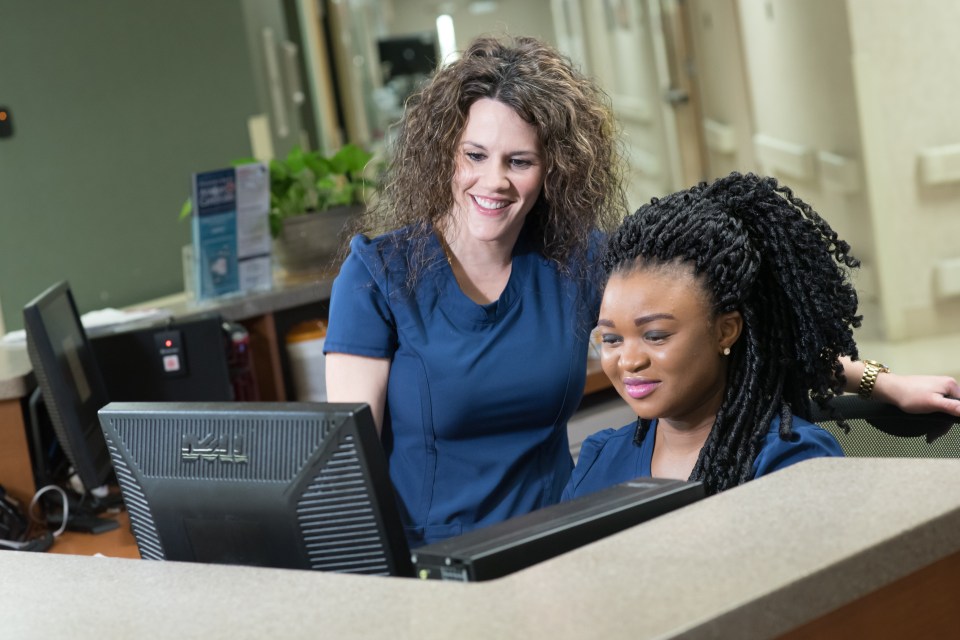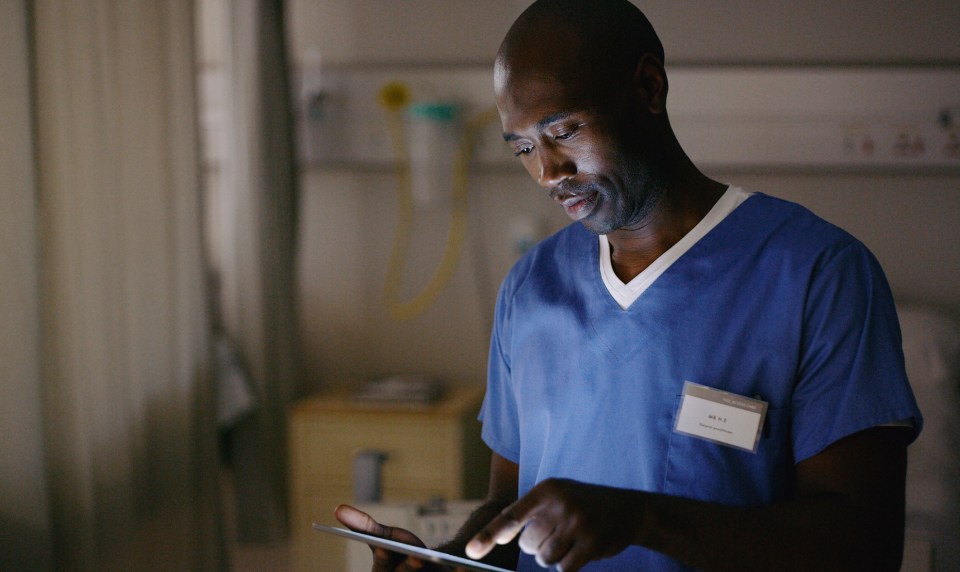Why working in inpatient rehabilitation may be right for you
Congratulations! If you are reading this, you may have just graduated with a nursing degree. You are about to embark on a journey throughout one of the most rewarding careers in healthcare. Regardless of what type of nursing environment you work in, there are best practices that help a new nurse get up to speed, and you will want to look for these support systems as you search for your first nursing role.
What is the difference between inpatient rehabilitation hospitals and skilled nursing settings?
The structure of the nursing department will vary based on facility type and clinical acuity of the patients. In a hospital setting such as Encompass Health, you can expect to have a nurse supervisor or manager that is responsible for making sure you have proper training and skill development. There is also usually supervision during the evening and weekend shifts. The supervisor or manager reports to the chief nursing officer (CNO), who strategically runs the department and ensures close collaboration with physicians, pharmacy, therapy, respiratory and support services. The majority of nurses you work with are registered nurses supported by rehab nurse techs. Working in a hospital setting allows you to develop your skills as you perform procedures that are more complex.
In a skilled nursing facility, also known as nursing homes, nurses usually report directly to the director of nursing who works on day shift. The majority of nurses are LPNs, and the federal government only requires at least one 8-hour RN shift per day. There are nurse techs assigned to help care for the patients, and they perform ADL support. A skilled nursing facility usually does not have an onsite pharmacy, and both wound care and respiratory services are limited. Many skilled centers do not perform complex procedures, such as transfusions, wound vacs, IV or trach care.
Staffing
In all environments, staffing will vary due to census fluctuations, acuity, pending admissions and discharges, and special circumstances that may occur. Generally, nurses in hospital environments have smaller patient assignments than long-term care and skilled nursing facilities. In skilled nursing facilities, a nurse can have between 18-38 patients. According to a recent Modern Healthcare article, staffing often falls below CMS guidelines in this type of facility.
A hospital nurse will have a significantly smaller assignment, most often adjusted for acuity, shift and pending admissions. Staffing varies significantly based on acuity. The more acutely ill the patient is, the more resources a hospital will need to apply, such as nursing care and equipment. Nurses who have less acute patients that can assist with self-care and patient mobility tasks will have an assignment with more patients; however, in the hospital environment staffing is dramatically different from skilled nursing facilities.
Onboarding and training
Onboarding is the process of integrating with the culture and team when you first start a job. It is about building connections with your new team, getting to know your manager and understanding your new environment. Sadly, some employers do not spend much time onboarding and spend almost all of the time training a new nurse. New graduate nurses need more support in this process, since they do not bring years of RN experience to their new job.
Training teaches you tasks of the job, policies and procedures, and how to use technology and equipment. All employers do this to some degree, but some only provide a basic overview and expect the nurse to figure it out on the job over a few days before they get a full assignment. In those environments, new graduate nurses may get a few extra days paired with an experienced nurse. New hire nurses in an environment where there is little investment in training puts the nurse into a situation where they are not ready, which can put patients at risk.
Employers that use best practices for onboarding and training keep nurses engaged and growing in their career while providing optimal patient care and safety. At Encompass Health, onboarding and training processes occur over the course of your first year of employment and consists of several components. Its purpose is to foster assimilation, connection, and alignment with hospital and company goals.
Onboarding at Encompass Health includes general and department-specific orientations, an assigned preceptor, manager check-ins and opportunities for you to provide feedback.

Orientation
General orientation helps acclimate all employees to the company. Encompass Health orientation introduces you to the Company purpose, values and expectations for the patient experience. Information is shared about the hospital, departments and local management team. You will learn what to do in the event of an emergency and how to use key systems to access time records and online learning. You will learn about how the teams embody inclusion and diversity. During orientation, you are introduced to ways that you can get involved in teams and activities at the hospital.
An important part of general orientation is meeting other individuals recently hired who might work in different departments than you, which will help kick-start the connections you’ll make while working at the hospital. There are activities built into the curriculum that help you get to know your peers and interact.
After general orientation, you attend a comprehensive nursing orientation, meet your new team and become acquainted with the department. You receive advanced mobility training and have additional classes and experiences that help you build your clinical knowledge before you work with your preceptor. You will also learn about The Joint Commission® expectations for hospital accreditation and disease-specific certifications.
Preceptor Assignment
At the conclusion of orientation, you are assigned a preceptor. A preceptor is a seasoned employee that helps you become proficient in your role and guide you through various job tasks using a robust onboarding checklist. You will have a preceptor through your first year, although their involvement in teaching and training you will wane as you progress. Later, they may become more like a coach or a mentor to you.
Manager Check-Ins
In addition to your preceptor, you will have regular check-ins with your manager at your 30, 60 and 90-day milestones, as well as your 6 and 9-month milestones, and your 1-year anniversary. Check-ins are a way for your manager to ensure you are on track with your learning, as well as to ensure that you have the support you need at work. At times, other members of the nursing management team may check in with you to talk about what you need on the job and to understand any challenges you may be facing.
Your management team will also support you in career development and help you explore the many opportunities you have at Encompass Health. One opportunity a registered nurse can take advantage of is the Certified Rehabilitation Registered Nurse (CRRN®) development program. The Company will pay for the certification test through the Association of Rehabilitation Nurses®, and when you pass, you receive a promotion to CRRN along with a pay increase. Courses and study materials are also available to help nurses prepare.
Looking to the future
As a new nurse, you may take a while to feel like you fully understand your role and you are truly efficient at managing patient care. As long as you are in an environment that supports learning, you can grow into a highly skilled clinician. Your manager, preceptor, CNO, human resources director and your teammates invest in your success and want to support you as you grow.
In the first year and beyond, ask questions and look for opportunities to care for patients with conditions you have not yet treated. Take advantage of supplemental learning opportunities such as CEU events held at your hospital or available in an online learning system. Explore ways you can continue to learn and grow after the first year through certifications and advanced education.
The most important thing you can do is to set yourself up for success. Research online whether an employer invests in education through tuition reimbursement. During the interview, ask questions about onboarding and training, such as:
- How long is general orientation?
- How long is nursing orientation?
- Will I have a preceptor, and if so for how long?
- Is there a structured onboarding checklist?
- Will I be able to keep my clinical skills sharp through patient care? Will I be able to perform wound care, IV management and transfusions?
- Do you offer clinical courses onsite?
- Does your online learning system have options to earn CEUs?
- Can I renew my CPR certification onsite?
- Can I get involved in teams and activities here?
- Do you offer help with obtaining certifications?
At Encompass Health, we offer all of these things. To learn more about nursing career opportunities at Encompass Health, we invite you to stay in touch with us:
- Join our talent community so a member of our recruitment team can email you with more information.
- Sign up to receive job alerts most relevant to you.
- To pursue a career with Encompass Health, you can search for open opportunities near you.
The content of this site is for informational purposes only and should not be taken as professional medical advice. Always seek the advice of your physician or other qualified healthcare provider with any questions you may have regarding any medical conditions or treatments.




